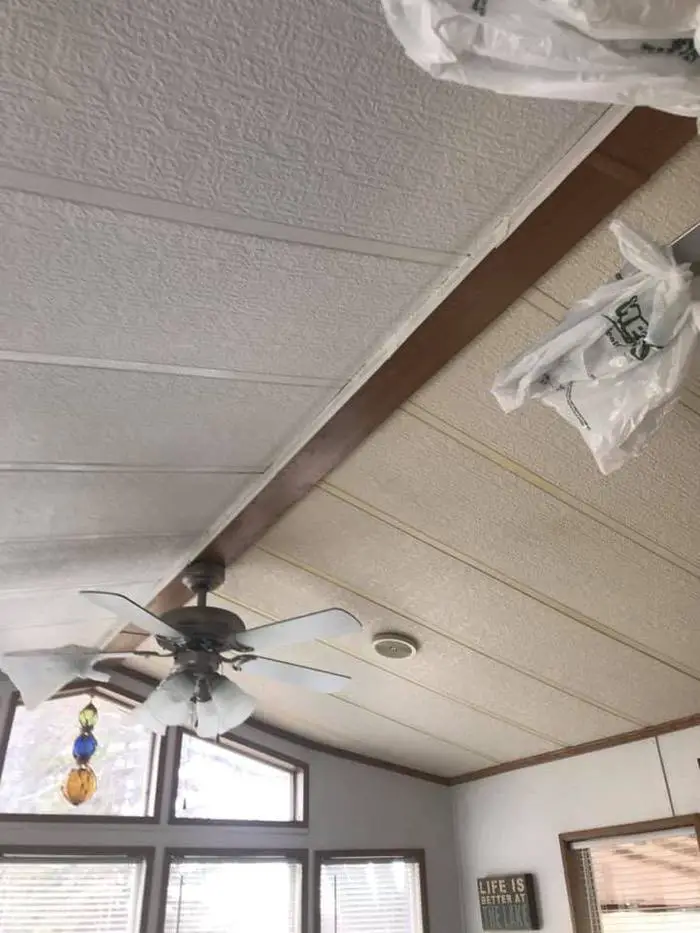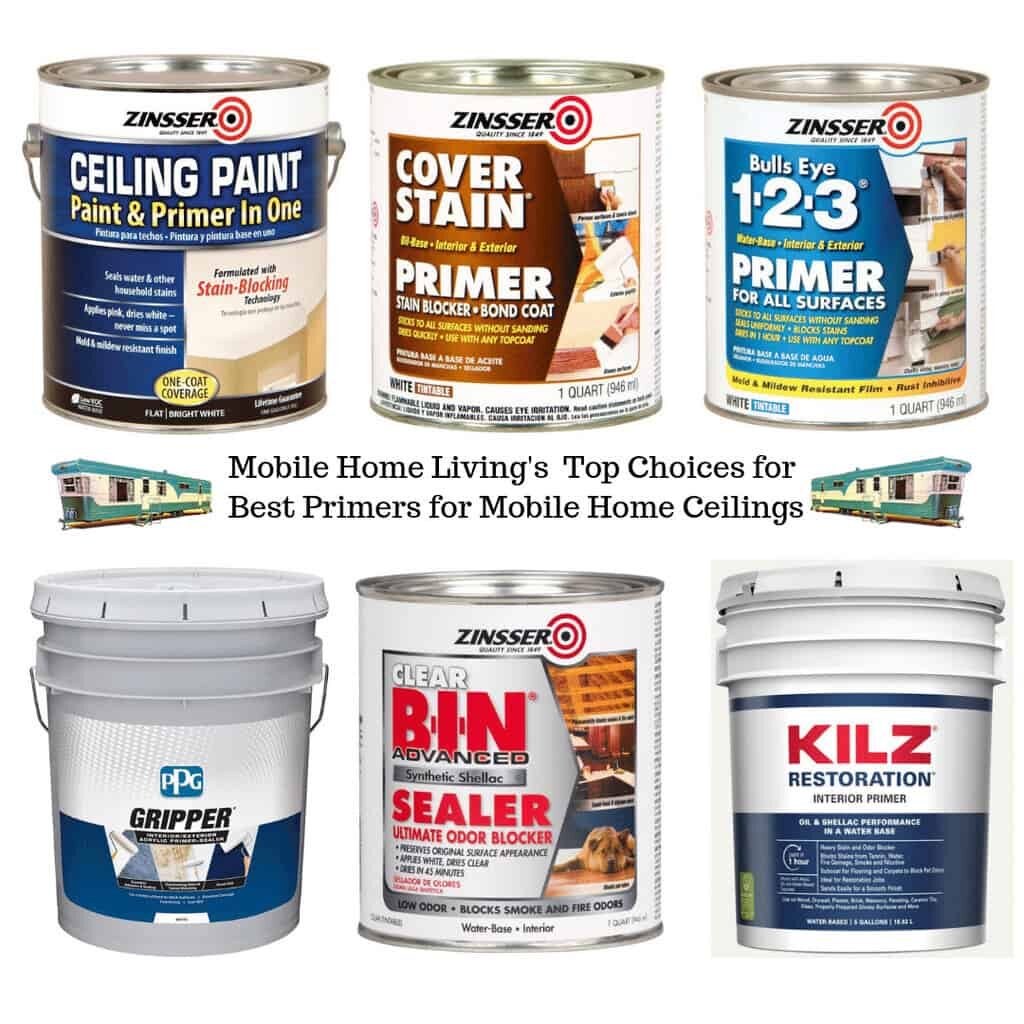I recommend that you paint mobile home ceilings as soon as you can. Make it your first project because the results are honestly amazing. A fresh coat of paint on a ceiling can change your entire home.
Unfortunately, painting a mobile home ceiling isn’t so easy.
Older mobile home ceilings tend to be yellow over time, and the least bit of water can create a huge stain. Of course, water stains on porous mobile home ceilings can be hard to cover. Usually, you can paint over them, but they tend to reappear after a few weeks.
Read our mobile home ceiling guide here.

This article will help you understand what your mobile home ceiling is made of and how to paint the panels and cover those pesky water stains so they stay covered.
Knowing the Type of Stain is Important When Covering It
Before you can cover a ceiling stain, you need to understand where the stain is coming from and repair the issue before it can be covered.
The location, shape, and color of the stain can help you determine the source of the issue.
Condensation Stains
Condensation water stains are typically in corners or around the exterior perimeter. Though they may have various shapes and sizes, they are typically much smaller and more numerous than a rain leak stain. They will have a white or light-colored center. If you have a condensation issue in your mobile home attic, you will probably need to add or repair your vapor barrier. If adding a vapor barrier is too difficult ( and it is) you can use an insulating primer on your ceiling panels to act as a mini-vapor barrier. Adding fans and vents to your attic space can also stop condensation stains on your ceiling.
Rain and Snow Leak Stains
A rain leak can be anywhere though common areas are around chimneys, walls, vent pipes, and light fixtures. In double wides, the marriage line is a common area for rain leaks. The Foremost Fix-It Guide says the stains tend to be “concentric rings which get progressively lighter as they move out. The center stain is dark because it is the oldest stain. Each “ring,” by the way, is a separate occurrence.”
How to Cover Brown Water Stains on a Mobile Home Ceiling
Painting a mobile home ceiling isn’t easy, and if your ceiling has water stains, it can be even more difficult. This is because mobile home ceilings are made of a unique gypsum panel, and once it gets wet, it doesn’t accept paint either. Using a sealer or primer will help.
Professional fire and water damage experts recommend using a pigmented shellac like Kilz, XTM, or Bins to cover ceilings and walls with extensive smoke odor. If it can seal odor from a fire, it can surely seal a little water stain.
Related: Learn How to Update Vinyl Walls in Mobile Homes.
The market is filled with primers/stain blockers that all promise to get rid of that unsightly stain for you, but which ones really work? How can you be sure? The answer is simple, oil-based. Oil-based primers/stain blockers will offer you the best results for covering up all those ugly, unsightly, and embarrassing stains the first time around.
Primers can be any painter’s lifesaver. They provide a clean, smooth, uniform surface and stick to almost any surface you are prepping for paint.

Cover Ceiling Stains with Stain Blockers
Stain-blocking primers can be water or oil-based. The oil-based primers and sealers are recommended most for water stains on mobile home ceilings. While they can have an unpleasant odor, you can’t beat their ability to cover stains.
Water-based stain-blocking primers are not recommended for problems like water damage. Instead, professionals like water-based products for ink, crayon, and scuff marks in general. However, it’s worth mentioning that water-based products have gotten a lot better in the last few years. Water-based primers are virtually odorless and can be cleaned up with water, so it’s much easier to deal with.
A good quality oil-based primer such as KILZ or Zinnser is an excellent choice for covering existing water damage, nicotine, and smoke.
When using primers, it’s always a good idea to keep in mind the final result intended. If your final finish is white or a light color, then you are probably okay to use the white product straight from the container. However, if the final finish is a darker color, you should probably tint the primer. Any home improvement center with a paint center can do this for you.
Typically after you have applied the primer, you should apply your finish coat within 48 hours, as most primers are designed to chemically bond with the paint. If you miss that time frame, you may need to reapply another coat of primer. Of course, you should check the manufactures specific detailed instructions.
Water-Based and Paint and Primer in One?
Many professional painters are not big fans of the paint and primer in one product, especially on smooth surfaces like drywall, but they seem to do OK with textured surfaces. Plus, it can save a ton of time.
The most popular paint and primer-in-one products are from Zinnser.

Best Brushes and Rollers for Ceilings
I’m not a professional painter by any means, but I have painted my fair share of mobile homes. The best lesson I’ve learned is to use high-quality brushes and rollers.
Pip received some good advice from her neighbor, who happens to be a professional painter with 35 years of experience:
Use a lambswool roller to get a smooth coat. Lambswool is a bit more expensive, but it doesn’t throw paint as much as other rollers and it leaves a nice smooth finish.
How to Paint Mobile Home Ceilings
Buy the highest quality paint, primer, brushes, and rollers you can afford. The best pigments and binders cost more, so paint is a ‘get what you pay for the product. The more expensive brushes and rollers use better materials which makes painting easier in the long run.
Step 1 Tape and Cover
Painting a ceiling is a messy project. The thicker the paint, the farther the small specks will fly, or so it seems. Cover everything you don’t want to have white polka-dots. This includes ceiling fans, light fixtures, and trim that isn’t being painted.
Step 2 Apply Primer / Sealer
Brush the primer around the perimeter and fixtures. Follow the manufacturer’s instructions after you’ve cut the perimeter in, start rolling the primer on the rest of the panels. Let dry. A second coat may be necessary for the darkest stains.
Step 3 Paint
Depending on the manufacturer’s instructions, you may need to allow the primer at least 24 hours but no more than 48 hours to dry before you paint. This time frame can help the paint bond to the primer. You’ll cut the paint in the corners and perimeter with a brush and then roll the middle area.
Other Tips for Covering Mobile Home Ceiling Stains
Tip #1 – Try Chalk, Shoe Polish, or Tub Caulk
- Lighter stains may not need a complete paint job (though that’s always the better idea). Foremost also recommends trying chalk or white shoe polish, and “for knicks or dents in a textured ceiling, apply white tub caulk.” You can dab the caulk with plastic bags to make it match the texture of the gypsum ceiling panel.
Tip #2 – Try Spraying your Ceiling with 3% Hydrogen Peroxide
- Richard Santoro, a retired, 40-year veteran of the restoration business that has worked on thousands of water, fire, soot, and smoke damage restoration jobs, gave us some advice for those who have popcorn ceilings stained or yellowed from cigarette smoke. It only takes a few minutes using H2O2 and a pump sprayer – no painting involved.
Your local CVS or Walmart usually carries dark brown bottles of 3% Hydrogen peroxide (H2O2). Just pour them into a new, 1-gallon pump sprayer and spray your ceiling using a circular motion while overlapping each round a bit.
Learn why Hydrogen Peroxide is packaged in a dark brown bottle here.
Start in a corner and work your way towards the door. Do not soak the ceiling. Lightly cover it and move at a steady pace. If all goes well, you will have nice white in a day or so. Don’t forget to cover your floor and furnishings.
Should you Paint or Replace your Mobile Home Ceilings?
If your mobile home ceilings are too damaged or sagging, they may need to be replaced. Unfortunately, this is even more difficult than painting your mobile home ceilings but not because of the process or the cost; It’s extremely hard to find the ceiling panels.
You can learn more about finding and buying gypsum ceiling panels here.
Thank you for reading Mobile Home Living!
As always, thanks for reading Mobile Home Living®!


To those using kilz to seal stains. Only oil based will prevent bleed though. Water based will always let the stains bleed through.
Yes. It can be scraped off. Of course its a messy and time consuming process but the results turn out well usually!
Can the popcorn texture on the ceiling be removed?
Hi Brenda,
You may be able to add a texture over your entire ceiling to ‘seal’ the cracking (if you can repair it first that’s better). You may be able to just paint it and the paint will seal small cracks up pretty well. The thicker ceiling paint is great at covering up small cracks and crevices.
Thanks!
I have cracked ceiling tiles. It,looks like the top layer is peeling. Does anyone have a suggestion as to how to repair it
Thank you,
Brenda
Now that you mention it, I have heard someone say hairspray would help seal spots before you paint. Thank you for sharing that, I appreciate it so much!
I have painted quite a few ceilings with water spots. Kilz will not cover water spots; they bleed through. To keep water spots from bleeding through primer and paint first spry the spot the with CHEAP aerosal hairspray then prime and paint. Water spot will not bleed through anymore.
Thanks for the tip, Pip!
I’ll add it to the article!
I am told by my neighbor who is a painter of 35yrs, use a lambswool roller. This type will not spray the little dots of paint every where while rolling. Its true, he has done my ceilings with very little room prep and the roller did not spray paint on anything.
Thank you so much, Richard! I added this to the article so no one would miss it. I’d never heard of it before but I know H202 is a whitener. Thanks so much!
Here is a tip for those who have popcorn ceilings that are stained or yellowed from cigarette smoke who want nice, white ceilings again.
And you wont even have to paint them. And you’ll spend a fraction of the money and takes only minutes. Use H2O2 and a pump sprayer.
I am a retired, 40 year veteran of the restoration business. I have done thousands of water, fire, soot and smoke damage restoration jobs so I know that this works and works well.
Simply go to your local CVS, or Walmart and buy a many brown bottles of 3% Hydrogen peroxide (H2O2) as you might need and pour them in a new, 1 gallon pump sprayer. Using circular motion and overlapping by 15% start spraying starting in a corner and work your way towards the doorway out. Do not soak the ceiling. Just get it covered and move at a steady pace. Not fast, but not slow neither. By the next day you will have nice, white ceilings again. Don’t forget to cover your floor and furnishings.
Hi Leela,
I know I’ve answered this comment before but my commenting system in on the fritz so I’m answering it again, sorry. You should have received an email with my first answer. I’m from the east coast so I’m not familiar with swamp coolers but we always use Kilz to paint our ceilings. Yes, technically you do need the ceiling to ‘breath’ but I doubt a layer or two of paint will cause an issue.
Best of luck!
I have a question. I have an old Mobile Home with a Swamp Cooler. Around the Swamp Cooler where cool moist air is impacting some portions of the Ceiling Tile, I am wondering what type of spray paint to use to cover the places where the white paint on the tiles have vacuumed off (after letting the tiles dry out). I was told by a handyman, that you have to let the ceiling tiles “breathe” if they are to come in contact with moisture. Anyone have any experience with this?
Hi Sherrie,
Zinsser is a very good primer from what I hear. You should have no problem, just make sure you clean the walls well before you prime or paint. Best of luck!
Is Zinsser 123 Primer just as good for on paneling in a 1973 mobile home? If not, what is the difference between them?
Thanks y’all for the tips, especially the hair spray tip. I can’t rid of the stain even after the Kilz. I have done the whole ceiling in Kilz and it looks great except that spot. I hope it works on that spot after the Kilz.
Years ago I bought an old 1950’s mobile home from an acquaintance of mine. The home had been left for decades abandoned in a field so of course the roof had leaked and there were unsightly water stains on the ceiling. I put 9 coats of Kilz on one of the stains and it still bled through when I painted. A part-time employee at Lowes (associate by day; band member by night) told me to get the cheapest aerosol hairspray I could find (think Aqua-net) and spray the spot with that then put a coat of Kilz and then a coat of paint. Worked like a charm! He said to always spray the hairspray on first and I could save a fortune on Kilz. I have used this technique many times since and have shared this secret many times over the years and it works every time.
Thanks for the tip Allison! Appreciate you!
An inexpensive alternative to a stain blocking primer is old fashioned shellac. It comes in both clear (“white”) and amber; either works very well and both paint and wallpaper adhere well to it.
Thanks for sharing this informative post. Stained ceiling is not good to look at and it will really be important to know the techniques and useful tools to get rid of imperfections that affect the entire look of your home. Some DIY techniques work and you may even be surprised to see how you can do a lot without mess by simply choosing the right tools.